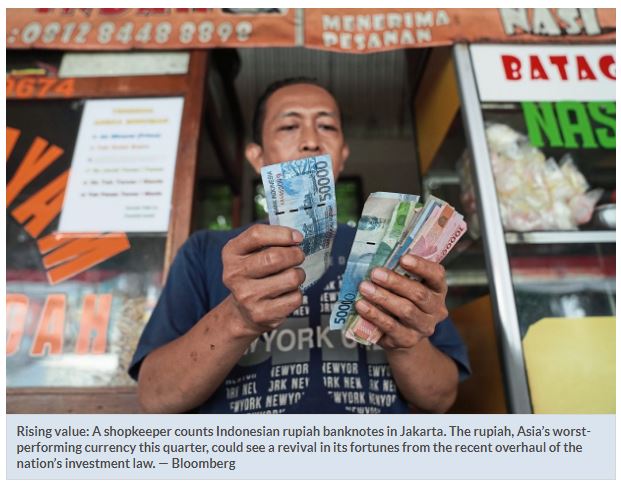New Indonesian law boosting laggard currency
JAKARTA: The Indonesian rupiah has languished at the bottom of Asian currency rankings for most of the year but a recent overhaul of the nation’s investment law may help revive its fortunes.
The rupiah rose about 1% against the dollar last week after Indonesia approved its first omnibus law aimed at cutting red tape to boost investments and create jobs.
That’s after a loss of 4.1% in the quarter ended September amid concern over Bank Indonesia’s (BI) independence, debt monetisation and an economy poised for its first annual contraction since 1998.
“The passing of the omnibus labour law is good news for the rupiah, as it’s a long-term structural reform that will improve the growth prospects of the economy, ” said David Forrester, FX strategist at Credit Agricole CIB in Hong Kong. “We forecast the US dollar/rupiah to reach 14,500 by year-end.”
The rupiah, which traded at 14,700 against the dollar on Friday, has fallen 5.7% so far this year as Asia’s worst performer.
Even though the rupiah failed to breach resistance at its 200-day moving average, support near 15,000 has held in the second half of the year aided by a burgeoning trade surplus, and BI’s support.
Not only has the central bank intervened in the currency market, it has also left rates unchanged at its last two meetings.
Rupiah bulls will therefore be focusing on the central bank’s policy decision today, hoping that it continues to prioritise the currency’s stability over growth by keeping rates at present levels.
All of the nine economists in Bloomberg’s survey forecast that BI will continue to be on hold.
Global risk sentiment still remains a risk for the rupiah’s appreciation, given that 27% of the nation’s bonds are held by foreign investors.
The virus spread is another concern as the nation reported the most number of cases last week since the start of the outbreak.
And while investors have cheered the new investment law, workers have mounted protests on concerns it erodes their labour rights.
“The outlook for rupiah in the coming weeks will hinge on global risk sentiment given it is a high yielder in Asia, ” said Irene Cheung, FX strategist at ANZ Banking Group Ltd in Singapore.
“On this front, the US election will be a key watch given the high uncertainty and news flows.”
Last month, the central bank had stepped in to ease pressure on the rupiah as it hit a low on the back of concerns that a proposed new framework for monetary policymaking could undermine the bank’s independence.
Key Asian economic data and events due this week include Japan’s PPI and core machine orders, Malaysia’s industrial production and India’s CPI and industrial production.
Others include RBNZ’s Bascand speaks and New Zealand’s retail card spending, China’s trade balance and BI’s rate decision. — Bloomberg


 Thailand
Thailand




